Throughout His ministry, Jesus served His Father by loving and caring for those in need. When we consider our relationships with others, do we really love them like Jesus? As part of both the 2013 and 2017-18 Global Church Member Surveys (GCMS), members of the worldwide Seventh-day Adventist Church were asked about how they ranked themselves in relational areas of faith maturity (i.e., the strength of a person’s relationship with God and how that relationship influences his or her social relations).
In both surveys, respondents were asked how often they feel responsibility for reducing pain and suffering in the world. The 2013 survey revealed that a majority (74%) of respondents often or sometimes-often felt this responsibility. However, less than one in five (17%) respondents felt this way sometimes, while about one in ten (9%) reported that they rarely or never felt responsible for reducing pain and suffering.
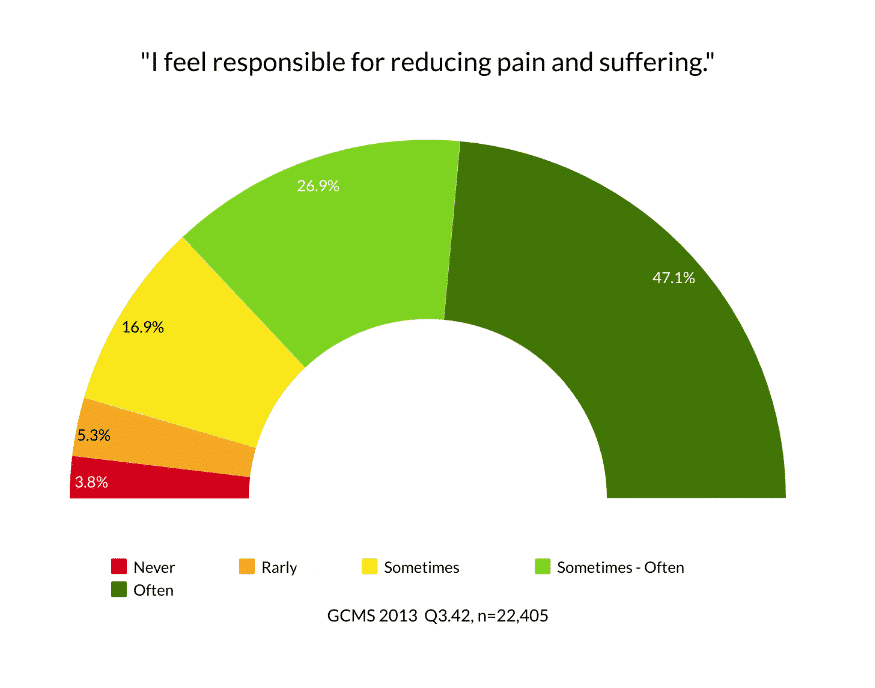
When the same question was asked in the 2017-18 survey, slightly less (69%) respondents reported often or sometimes-often feeling responsible for reducing pain and suffering in the world, although results for “often” were the same. Additionally, slightly more (18%) respondents than in the 2013 study shared that they felt this responsibility sometimes, and a greater number (13%) admitted that they rarely or never felt this way.
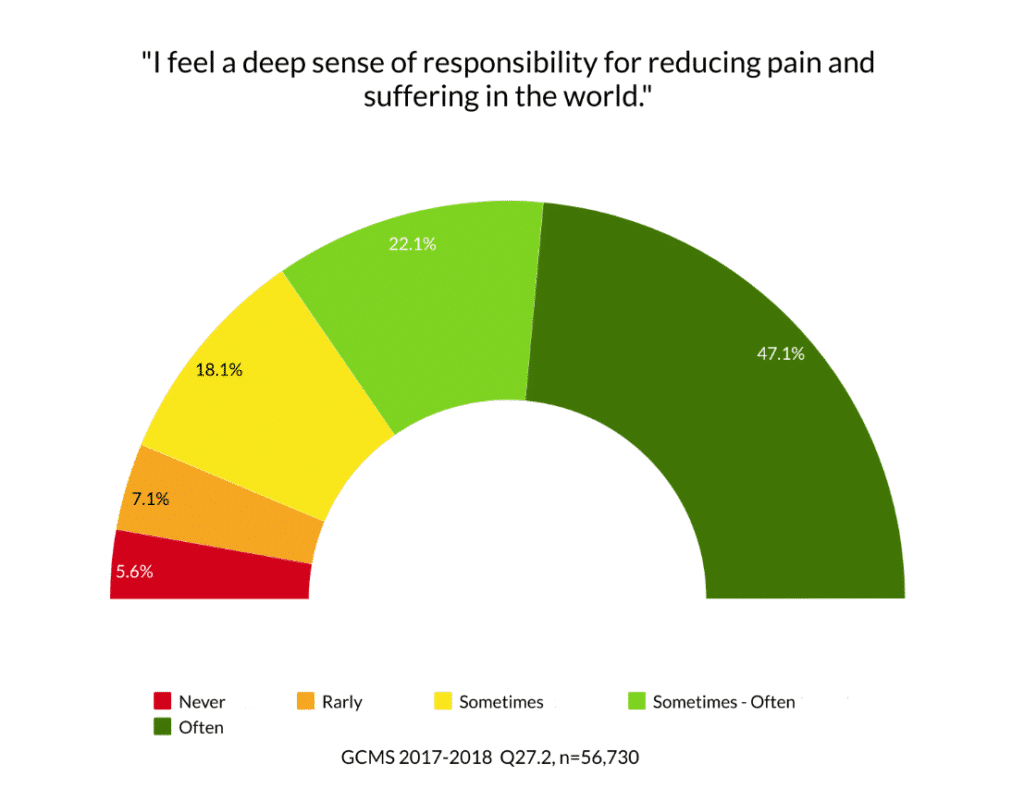
While members globally overall seem to have a fair amount of concern about the wellbeing of others, how do they put this concern into action? With this question in mind, the 2013 GCMS asked participants how often they gave of their time and money to help other people. Over half (56%) of members reported that they often or sometimes-often gave of their time and money to help. However, a quarter (26%) reported that they only did so sometimes, while nearly one in five (18%) rarely or never gave of their time and/or money to help others. Could it be that perhaps respondents were more like to give of either their time or money individually, thus resulting in the seemingly low involvement in giving?
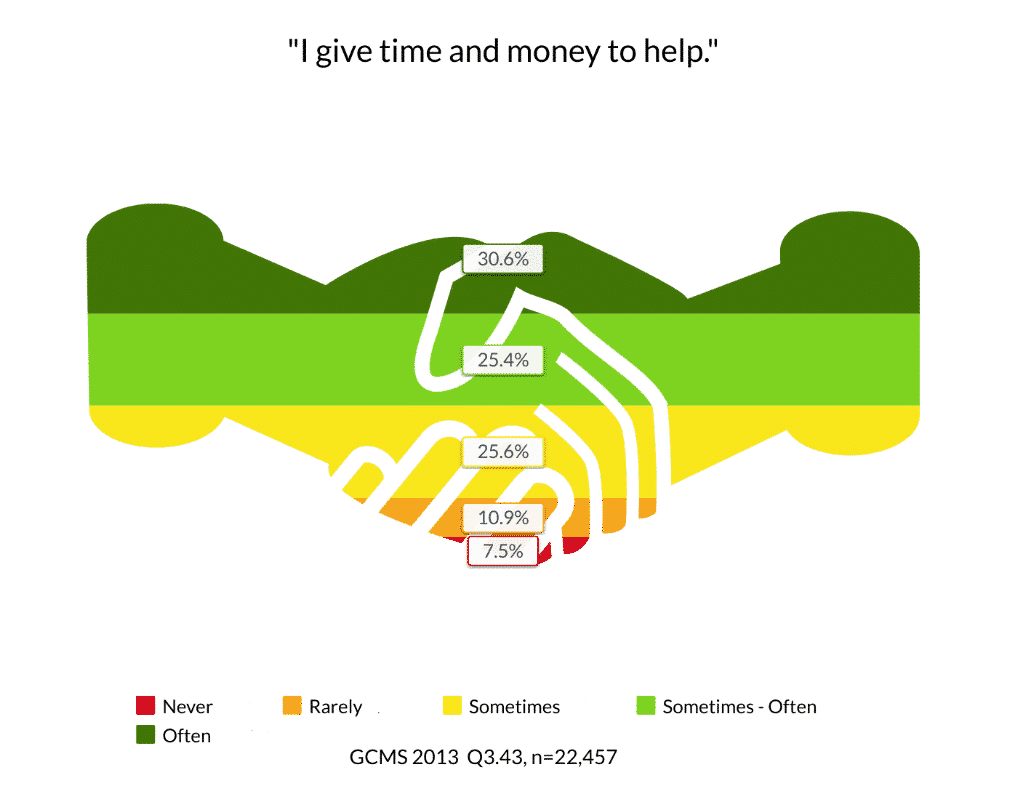
The 2017-18 GCMS divided this survey item out into separate questions, asking respondents if they gave of their time and money, separately. Interestingly, global respondents seem more willing to give of their time than their money. While 57% said they often or sometimes-often gave their time to help people, only 45% did that with their money. The results show the same trend in each category: there is an eight-percent gap between giving of time and giving of money in “often” category a five-percent gap in “sometimes-often” category. And, unfortunately, the gap increases in “rare” or “never” categories: while 18 of respondents rarely or never gave of their time, many more (30%) respondents never gave of their money to help others. It would seem that members worldwide have a harder time giving up their money as opposed to their time.
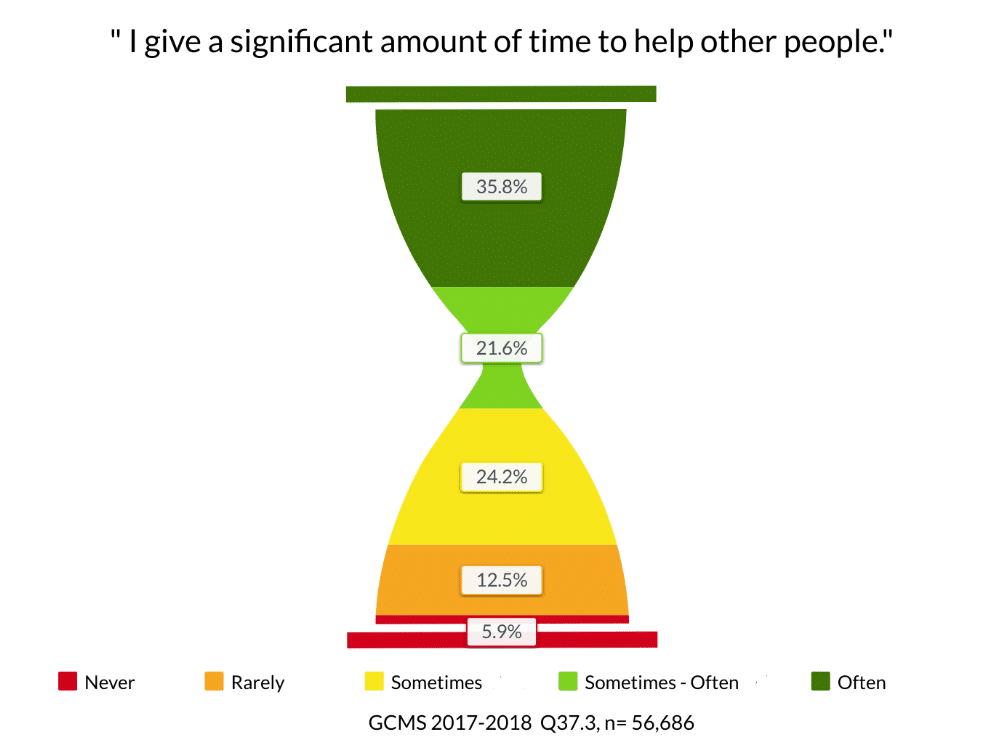
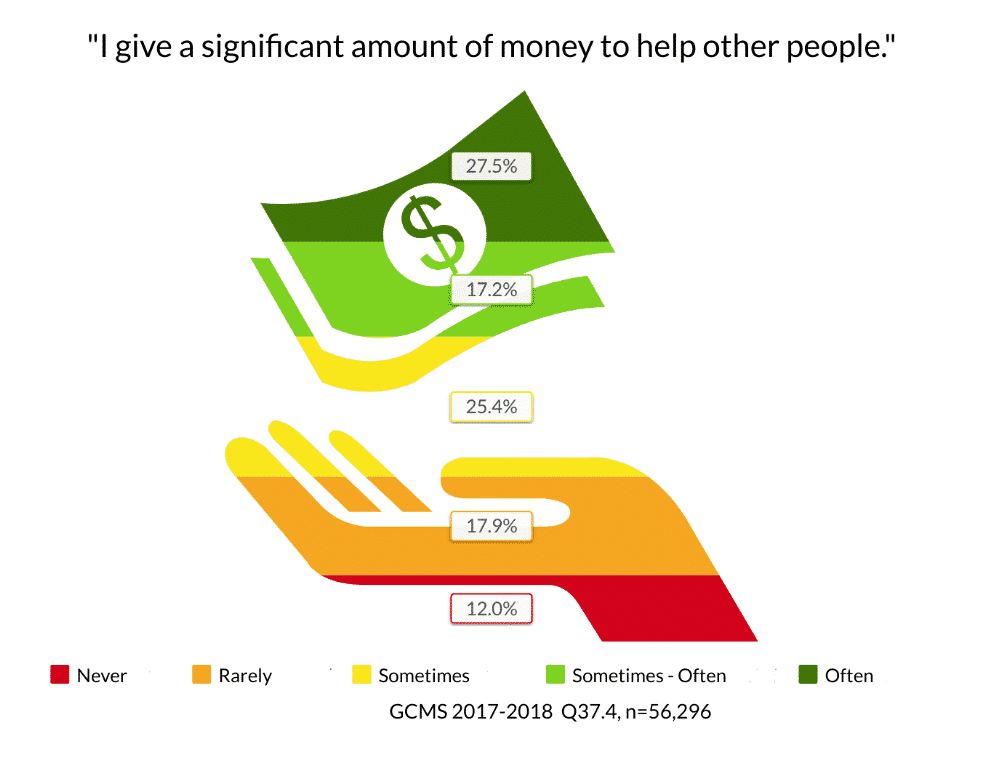
When asked how often they show that they care about reducing poverty in society, participants reported a lower amount of actionable care in 2017-18 than in 2013. The 2013 study showed that three out of five (60%) of respondents often or sometimes-often showed they care, with 18% sharing that they rarely or never did so; in the 2017-18 study, only half of respondents often or sometimes-often showed that they care, and ten percent more (27%) rarely or never did so. Thus, across the board, members in the 2017-18 GCMS reported lower feelings of responsibility for pain and suffering, as well as showing they care about reducing poverty, than members in the 2013 survey.
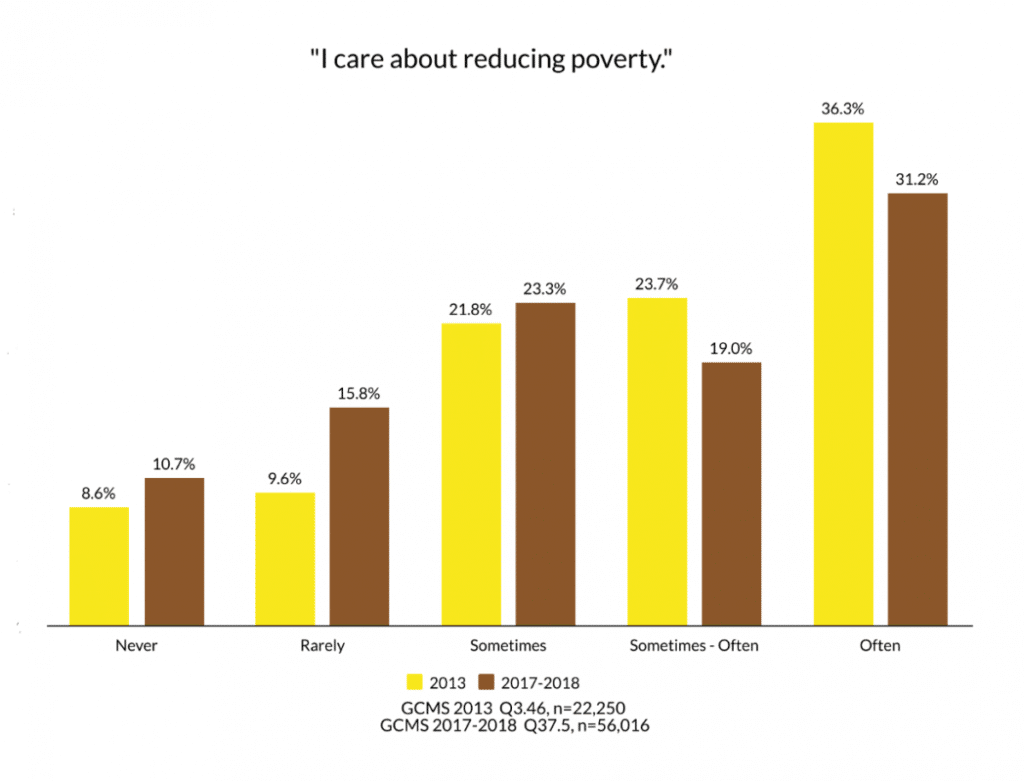
Both the 2013 and 2017-18 survey questioned if Adventists apply their faith to political and social issues. The 2013 GCMS showed that almost half (47%) of respondents often or sometimes-often did so, with 35% reporting that they rarely or never did so. The 2017-18 survey had a similar number (49%) of respondents reported that they often or sometimes-often applied their faith to social issues, while 34% rarely or never did.
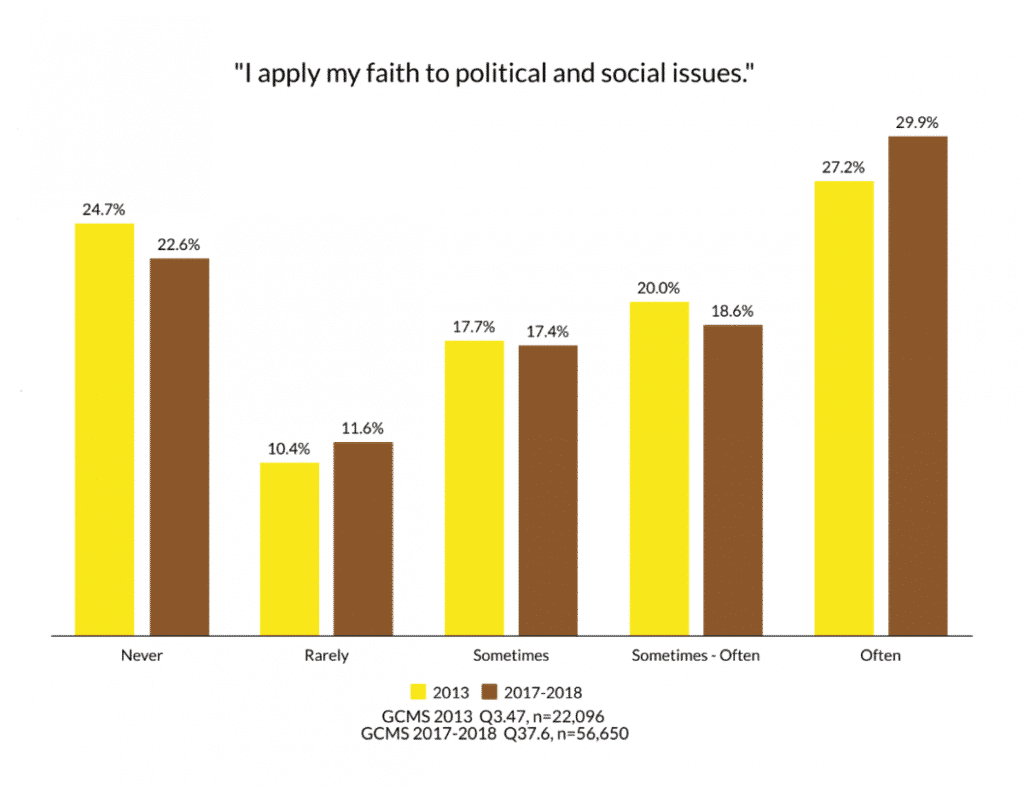
With all this in mind, how do Adventists worldwide rank their lives in terms of being filled with meaning and purpose? A majority (85%) of respondents in the 2013 survey reported that they often or sometimes-often felt that their life is filled with meaning and purpose. One in ten admitted they sometimes felt this way, while the remaining respondents reported rarely or never feeling as if their life had meaning and purpose.
The 2017-18 survey results were similar, with 83% of respondents reporting that their life was often or sometimes-often full of meaning and purpose. About one in ten respondents reported that they felt this sometimes, while again a small percentage rarely or never felt that way.
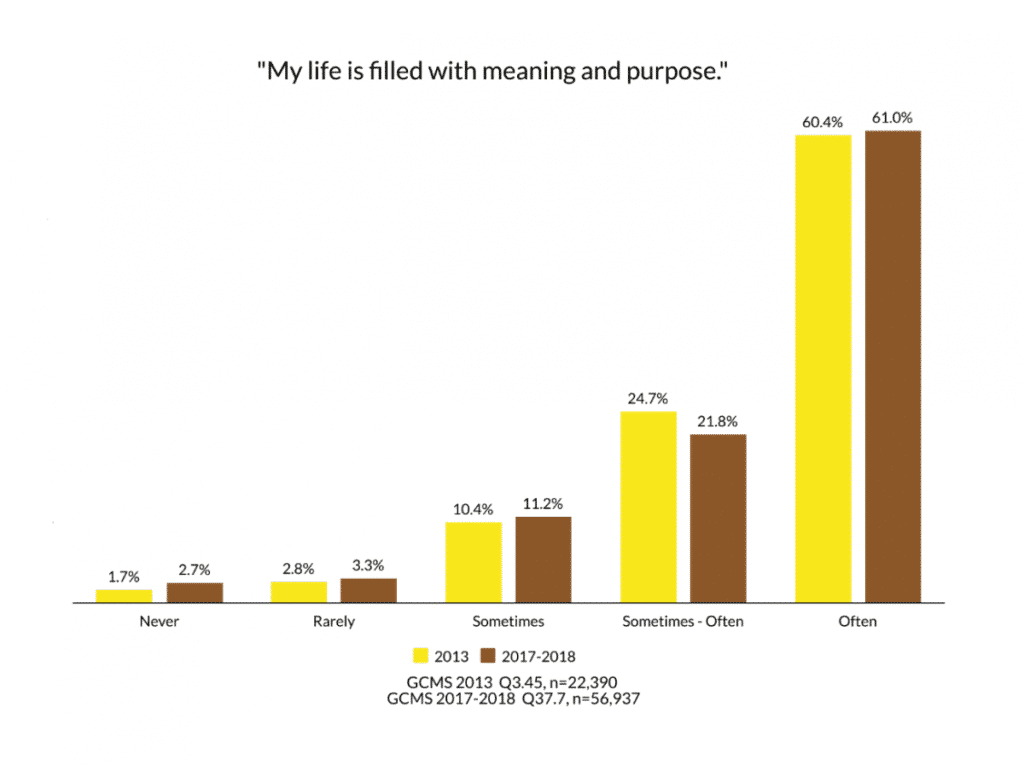
Thus, both GCMS show that there is a considerable number of church members in the Adventist Church that are concerned with pain and suffering in the world and are willing to be involved in reducing poverty and apply their faith to political and social issues. However, the results for concerns are higher than the results for real actions. Church members seem also more willing to give of their time than their money. Unfortunately, the 2017-18 GCMS findings are lower in each question compared with the findings of 2013. At the same time, both surveys demonstrate that, overall, a strong majority of Adventists around the world have meaning and purpose in their life which is a great witness of their living faith.
When you consider your own responses to these statements, how do you rank? Do you match up with the majority of global participants, or are you an outlier? No matter what your answer, here is the ultimate question: are you seeking to be more like Jesus every day, loving God and loving others as He did?
If you are interested in more data regarding Faith maturity, please see our previous blogs on this subject and also the Meta-Analysis report:
Created in collaboration with the Institute of Church Ministry

